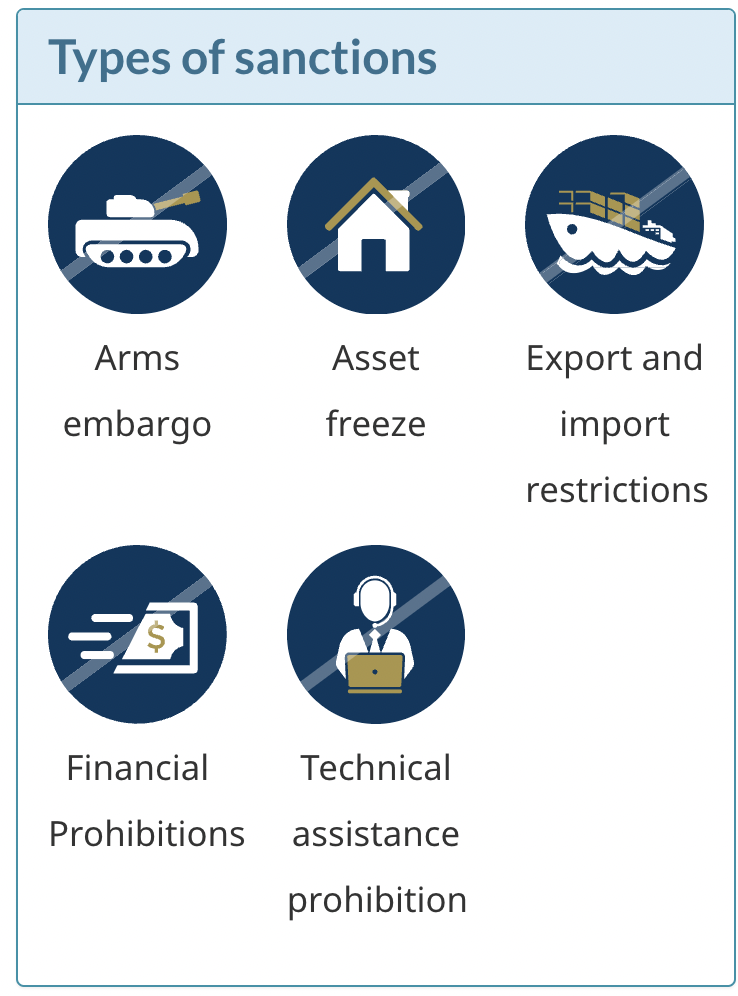
Canadian Sanctions Related to Iran
- Website: https://www.international.gc.ca/world-monde/international_relations-relations_internationales/sanctions/iran.aspx?lang=eng
Prohibitions
Sanctions related to Iran were enacted under the United Nations Act and the Special Economic Measures Act in response to Iran's nuclear and weapons of mass destruction (WMD) programs, as well as gross and systematic human rights violations that have been committed in Iran. On February 22, 2007, the Regulations Implementing the United Nations Resolutions on Iran came into force. On July 22, 2010, the Special Economic Measures (Iran) Regulationscame into force.
Sanctions under the Regulations Implementing the United Nations Resolutions on Iran (the Iran UN Regulations) were modified on February 5, 2016 to implement the changes to the United Nations sanctions against Iran as decided by the Security Council of the United Nations in Security Council Resolution 2231 (2015). Ongoing restrictions on dealings with Iran under the Iran UN Regulations include:
- prohibitions on the export to Iran of:
- items, materials, equipment, goods and technology related to uranium enrichment, reprocessing or heavy water-related activities, or to the development of nuclear weapon delivery systems (products listed in the International Atomic Energy Agency's Information Circulars INFCIRC/254/Rev.12/Part 1 and INFCIRC/254/Rev.9/Part 2 and UN Security Council document S/2015/254, as well as to a number of goods listed in Group 1 (Dual-Use List) and Group 2 (Munitions List) in A Guide to Canada's Export Controls;
- items, material, equipment, goods and technology related to goods listed in the Missile Technology Control Regime (2015/254);
- battle tanks, armored combat vehicles, large caliber artillery systems, combat aircrafts, attack helicopters, warships, missiles or missile systems as defined in the United Nations Registry of Conventional Weapons;
- a prohibition on the provision to any person in Iran of technical assistance, financial or related services related to the supply, sale, transfer, manufacture or use of the products subject to the export prohibitions;
- a prohibition on making available to any person in Iran any property, financial assistance or investment, related to the supply, sale, transfer, manufacture or use of the products subject to the export prohibitions;
- a prohibition on making property or financial services available to Iran for the purpose of investing in specified nuclear-related activities in Canada;
- a prohibition on providing any technology to Iran in respect of any activity related to ballistic missiles capable of delivering nuclear weapons;
- a prohibition on the acquisition and import from Iran of arms and related material;
- an assets freeze against individuals and entities who were listed by the Security Council or the Committee established pursuant to Resolution 1737 (2006) as of July 20, 2015 whose names were not removed by Resolution 2231, or any other persons who may be listed by the Security Council under Resolution 2231; and
- a prohibition against claims by Iran or designated persons in relation to any transactions prevented by reason of the sanctions imposed against Iran.
The Special Economic Measures (Iran) Regulations (the Iran SEMA Regulations) impose a dealings prohibition, an effective asset freeze, on designated persons listed in Schedule 1. The Regulations prohibit any person in Canada or any Canadian outside Canada from:
- dealing in property, wherever situated, that is owned, held or controlled by listed persons or a person acting on behalf of a listed person in Schedule 1;
- entering into or facilitating any transaction related to a dealing prohibited by these Regulations;
- providing any financial or related services in respect of a dealing prohibited by these Regulations;
- making available any goods, wherever situated, to a listed person or a person acting on behalf of a listed person in Schedule 1; and
- providing any financial or other related services to or for the benefit of a listed person in Schedule 1.
- exporting, selling, supplying or shipping any goods listed in Schedule 2 of the Iran SEMA Regulations, to Iran, to any person in Iran, or to a person for the purpose of a business carried on in or operated from Iran; and
- transferring, providing or disclosing to Iran or any person in Iran any technical data related to the goods listed in Schedule 2.
The individuals listed in Part 2.1 of Schedule 1 to the Iran SEMA Regulations are also inadmissible to Canada under the Immigration and Refugee Protection Act.
There are also provisions in the Criminal Code that prohibit certain dealings with listed entities. Canadian persons (both individuals and entities) should look closely at their legal obligations and do careful due diligence about prospective partners, customers or suppliers in Iran to ensure that they are not dealing with any listed entities.
Other Measures
In accordance with Resolution 2231, Canada imposes travel restrictions against persons listed by the Security Council, which are implemented in Canada via the Immigration and Refugee Protection Act.
Canada also continues to restrict the export to Iran of a wide range of sensitive products listed on the Export Control List (ECL), under the Export and Import Permits Act (EIPA). See Notice to Exporters Serial No. 196 for further information.
Permits and Certificates
Under the Iran UN Regulations, the Minister of Foreign Affairs may issue a certificate to authorize an activity restricted by the regulations, on a case-by-case basis, provided that the requirements of Resolution 2231 are strictly respected. The requirements may include obtaining the approval of the Security Council in advance.
A separate Special Economic Measures (Iran) Permit Authorization Order, made pursuant to subsection 4(4) of the Special Economic Measures Act authorizes the Minister of Foreign Affairs to issue to any person in Canada or any Canadian outside Canada a permit to carry out a specified activity or transaction, or any class of activity or transaction, that is restricted or prohibited pursuant to the Regulations.
Background
Between 2006 and 2010, the United Nations Security Council imposed four rounds of sanctions against Iran in response to its nuclear program. Acting under Chapter VII of the Charter of the United Nations, the Security Council adopted resolutions 1737 (2006), 1747 (2007), 1803 (2008) and 1929 (2010) imposing sanctions against Iran in response to the proliferation risks presented by Iran's nuclear program in light of Iran's failure to meet the requirements of the International Atomic Energy Agency (IAEA) and to comply with the provisions of earlier Security Council resolutions. The Regulations Implementing the United Nations Resolutions on Iran, as amended, implement the decisions of the Security Council in Canadian domestic law. Implementation of the travel restrictions imposed under UNSC Resolutions is ensured in Canada under existing provisions of the Immigration and Refugee Protection Act.
In July 2010, Canada imposed additional sanctions on Iran in close consultation with like-minded partners, including the United States and the European Union, under the Special Economic Measures Act (SEMA) upon a finding by the Governor in Council that Iran’s failure to meet its international obligations amounted to a grave breach of international peace and security that had resulted or was likely to result in a serious international crisis. The SEMA (Iran) sanctions were increasingly tightened through amendments made in October 2011, November 2011, January 2012, December 2012 and May 2013 resulting in a broad prohibition on exports and imports to and from Iran, subject to certain exceptions, and on financial transactions.
On July 14, 2015, the five permanent members of the UN Security Council (China, France, Russia, the United Kingdom and the United States) plus Germany, known as the ‘P5+1’, led by the European Union, concluded an agreement with Iran in its nuclear program called the Joint Comprehensive Plan of Action (JCPOA), which was endorsed by UN Security Council Resolution 2231 (2015). A key milestone for the nuclear deal was reached on what is known as “Implementation Day,” on January 16, 2016 following confirmation by the International Atomic Energy Agency (IAEA) that Iran had fulfilled the prescribed commitments under the JCPOA, rolling back Iran’s nuclear program and subjecting it to extensive and ongoing international verification. Implementation Day also triggered immediate changes to sanctions imposed by the UN, the United States and the European Union against Iran, resulting in significant nuclear sanctions relief for Iran.
On February 5, 2016, Canada amended its Regulations implementing the United Nations Resolutions on Iran in order to implement the decisions of the Security Council under Resolution 2231. In addition, amendments were made to Canada’s sanctions against Iran under the Special Economic Measures (Iran) Regulations in order to contribute to international efforts to recognize the progress made under the JCPOA, while restricting Iran’s access to sensitive goods from Canada, especially with respect to nuclear proliferation and the development of ballistic missiles. The amendments remove: the blanket prohibition on imports from Iran and exports to Iran (except for goods listed in Schedule 2); prohibitions on the transfer, provision or communication of certain technical data to Iran (except technical data related to goods listed in Schedule 2); broad prohibitions on providing or acquiring financial or other services to or from Iran; the prohibition on making investments in entities in Iran; and the prohibitions related to the provision of services to certain Iranian vessels. They also modify the list of individuals and entities in Schedule 1.
Recent Developments
On September 23, 2022, Canada strongly condemned the reprehensible detention and apparent killing of Mahsa Amini, a young Kurdish-Iranian woman who died while in custody of Iran’s Morality Police. Ms. Amini’s death was a direct result of the systemic harassment and repression that women face in Iran. Canada further condemned Iran’s violent crackdown against civilian protestors and its use of force against its own citizens.
Iran remains impervious to widespread appeals from Canada and the international community to respect the human rights of its citizenry and to fulfil its international human rights obligations.
On September 26, 2022, Prime Minister Trudeau announced Canada’s intention to impose sanctions on Iranian individuals and entities – including the country’s Morality Police – and its leadership.
On October 3, 2022, Canada amended the Special Economic Measures (Iran) Regulations to list an additional 25 individuals and nine entities in relation to Iran’s gross and systematic violations of human rights and/or Iran’s ongoing grave breach of international peace and security. Listed individuals are now subject to a broad dealings ban.
In addition to its egregious behaviour at home, Iran’s actions abroad, including weapons proliferation and malicious cyber activity, continue to threaten international peace and security and demonstrate the country’s complete disregard for the rules-based international system. Iran continues to use state-sponsored disinformation to spread false narratives that attempt to justify its policies.
On October 11, 2022, Canada further amended the Special Economic Measures (Iran) Regulations to list an additional 17 individuals and three entities in relation to Iran’s gross and systematic violations of human rights, ongoing grave breach of international peace and security and continued state-sponsored disinformation activities.
On October 19, 2022, Canada further amended the Special Economic Measures (Iran) Regulations to list an additional six individuals and four entities in relation to Iran’s gross and systematic violations of human rights, ongoing grave breach of international peace and security and continued state-sponsored disinformation activities.
On October 28, 2022, Canada further amended the Special Economic Measures (Iran) Regulations to list an additional four individuals and two entities in relation to Iran’s gross and systematic violations of human rights, ongoing grave breach of international peace and security and continued state-sponsored disinformation activities.
On November 10, 2022, Canada further amended the Special Economic Measures (Iran) Regulations to list an additional six individuals and two entities in relation to Iran’s gross and systematic violations of human rights, ongoing grave breach of international peace and security and continued state-sponsored disinformation activities.

